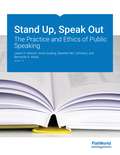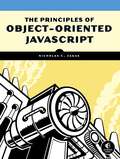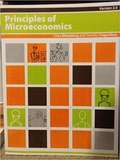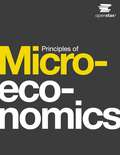Special Collections
Free Upskilling Books for All!
- Table View
- List View
Writing for Success
by Scott McleanScott McLean's Writing for Success is a text that provides instruction in steps, builds writing, reading, and critical thinking, and combines comprehensive grammar review with an introduction to paragraph writing and composition. Beginning with the sentence and its essential elements, this book addresses each concept with clear, concise and effective examples that are immediately reinforced with exercises and opportunities to demonstrate, and reinforce, learning.
Writing about Literature through Theory
by John Pennington and Ryan CordellWriting about Literature through Theory by Pennington and Cordell is the first introduction to literature text to embrace both the best of print culture and the opportunities of the digital age, while being grounded in the rhetoric and composition field pertaining to the developmental writing process. It is also unique because it uses literary theory as the foundation for students’ development as critical thinkers and writers. Following Gerald Graff’s ideas in “Disliking Books at an Early Age,” Writing about Literature through Theory uses theoretical approaches to open literary texts up to students across the disciplines. Writing about Literature through Theory focuses on writing as a process, and each chapter includes the following:
World Regional Geography
by Royal BergleeWorld Regional Geography: People, Places and Globalization is designed for students to experience and study as much of the world as possible within a limited amount of time. It gives students the fundamental concepts and the latest data regarding world places in a concise, easy-to-read format. This textbook focuses on the primary issues that have created our cultural and societal structures, and presents them within a framework for global understanding. A pattern of development is outlined from the imprint that European colonialism had on culture to the impact that giant retail corporations like Wal-Mart have on consumerism.
U. S. History
by OpenStaxThis textbook has been created with several goals in mind: accessibility, customization, and student engagement-all while encouraging students toward high levels of academic scholarship. Instructors and students alike will find that this textbook offers a strong foundation in U.S. history in an accessible format. About U.S. History U.S. History has been developed to meet the scope and sequence of most introductory U.S. History courses. At the same time, the book includes a number of innovative features designed to enhance student learning. Instructors can also customize the book, adapting it to the approach that works best in their classroom.
Understanding Media and Culture
by Jack LuleAccording to Jack Lule, the world did not need another introductory text in mass communication. But the world did need another kind of introductory text in mass communication, and that is how Understanding Media and Culture: An Introduction to Mass Communication was birthed.
The Sustainable Business Case Book
by Ross Gittell and Matt Magnusson and Michael MerendaThe issue of sustainability and specifically sustainable business is of increasing interest and importance to students of business and also students in the sciences, government, public policy, planning and other fields. There can be significant benefits from students learning about sustainable business from the rich experiences of business practice. The Sustainable Business Case Book by Gittell, Magnusson and Merenda is one of the first of its kind. It combines the the theory of sustainability with key concepts, analytical information and contextual information with a collection of cases which provide insights, perspective and practical guidance on how sustainable businesses operate from different business functional area perspectives. The Sustainable Business Case Book can be used as a stand-alone text or as a supplemental textbook for undergraduate courses that have an interest in sustainable business. While the book's primary focus is on the relationship between business and sustainability, the book can also be used in courses offered in fields other than business, including environmental and earth systems sciences, environmental studies, urban planning, economics and public policy.
Sustainability, Innovation, and Entrepreneurship
by Andrea LarsonThis book is suited for the Entrepreneurship or Innovation course with an emphasis on Sustainability or for a course devoted entirely to Sustainability. The deep roots of sustainability thinking are now evident in widespread and increasingly visible activities worldwide, this text will help you and your students explore that necessity, its implications and its progression.
Stand Up, Speak Out
by Jason S. Wrench and Anne Goding and Danette Ifert Johnson and Bernardo A. AttiasThe two key themes to Stand up, Speak out: The Practice and Ethics of Public Speaking make it a welcomed addition to the choices you have for a public speaking textbook. First it focuses on helping students become more seasoned and polished public speakers, and second, its emphasis on ethics in communication. It is this practical approach and integrated ethical coverage that sets Stand up, Speak out: The Practice and Ethics of Public Speaking apart from the other texts in this market.
Social Problems
by Steven E. BarkanSocial Problems: Continuity and Change by Steve Barkan is a realistic but motivating look at the many issues that are facing our society today. As this book's subtitle, Continuity and Change, implies, social problems are persistent, but they have also improved in the past and can be improved in the present and future, provided that our nation has the wisdom and will to address them. It is easy for students to read a social problems textbook and come away feeling frustrated by the enormity of the many social problems facing us today. Social Problems: Continuity and Change certainly does not minimize the persistence of social problems, but neither does it overlook the possibilities for change offered by social research and by the activities of everyday citizens working to make a difference. Readers of Steve Barkan's book will find many examples of how social problems have been improved and of strategies that hold great potential for solving them today and in the future.
Small Business Management in the 21st Century
by David T. Cadden and Sandra L. LuederSmall Business Management in the 21st Century offers a unique perspective and set of capabilities for instructors. The authors designed this book with a "less can be more" approach, and by treating small business management as a practical human activity rather than as an abstract theoretical concept. The text has a format and structure that will be familiar to you if you use other books on small business management. Yet it brings a fresh perspective by incorporating three distinctive and unique themes and an important new feature (Disaster Watch) which is embedded throughout the entire text. These themes assure that students see the material in an integrated context rather than a stream of separate and distinct topics. First, the authors incorporate the use of technology and e-business as a way to gain competitive advantage over larger rivals. Technology is omnipresent in today's business world. Small business must use it to its advantage. We provide practical discussions and examples of how a small business can use these technologies without having extensive expertise or expenditures.
Six Steps to Job Search Success
by Caroline Ceniza-Levine and Connie Thanasoulis-CerrachioThis book is a practical discussion of actionable steps (six of them!) that students can take to land a job regardless of the market. Whether the estimate is 25% unemployment or single-digit unemployment, that number doesn't apply to any one student. For any individual, the unemployment rate is 0% or 100%. One either has a job or doesn't. When any one person is looking for a job and there is 10% unemployment, that person just wants to be one of the nine people that has a job. Students might think even that one job is beyond their grasp. They think they don't have the right degree. Their school is in a different location than where they'd like to work. Not enough jobs are listed or employers are visiting the campus. This type of thinking cedes control of a student's search to outside forces. It is not up to professors, schools, career services support, or recruiters to get students a job. This book is about the proactive things that students can do to get themselves a job.
Sexuality and Our Diversity
by Marcus TyeSexuality and Our Diversity: Integrating Culture with the Biopsychosocial by Marcus Tye explores, with an integrated approach, the complex dimensions of biology, culture, psychology, sociology, history, and philosophy that explain human sexual diversity. While this text is primarily focused on the present, it also explores selected aspects of history to lend perspective to students that contemporary controversies have deep historical roots.
Ruby Under a Microscope
by Pat ShaughnessyRuby is a powerful programming language with a focus on simplicity, but beneath its elegant syntax it performs countless unseen tasks.
Ruby Under a Microscope gives you a hands-on look at Ruby’s core, using extensive diagrams and thorough explanations to show you how Ruby is implemented (no C skills required). Author Pat Shaughnessy takes a scientific approach, laying out a series of experiments with Ruby code to take you behind the scenes of how programming languages work.
You’ll even find information on JRuby and Rubinius (two alternative implementations of Ruby), as well as in-depth explorations of Ruby’s garbage collection algorithm.
Ruby Under a Microscope will teach you:–How a few computer science concepts underpin Ruby’s complex implementation–How Ruby executes your code using a virtual machine–How classes and modules are the same inside Ruby–How Ruby employs algorithms originally developed for Lisp–How Ruby uses grammar rules to parse and understand your code–How your Ruby code is translated into a different language by a compilerNo programming language needs to be a black box.
Whether you’re already intrigued by language implementation or just want to dig deeper into Ruby, you’ll find Ruby Under a Microscope a fascinating way to become a better programmer. Covers Ruby 2.x, 1.9 and 1.8
Risk Management for Enterprises and Individuals
by Etti Baranoff and Patrick Lee Brockett and Yehuda KahaneThis book is intended for the Risk Management and Insurance course where Risk Management is emphasized. When we think of large risks, we often think in terms of natural hazards such as hurricanes, earthquakes or tornados. Perhaps man-made disasters come to mind such as the terrorist attacks in the U.S. on September 11, 2001. Typically we have overlooked financial crises, such as the credit crisis of 2008. However, these types of man-made disasters have the potential to devastate the global marketplace. Losses in multiple trillions of dollars and in much human suffering and insecurity are already being totaled, and the global financial markets are collapsing as never before seen. We can attribute the 2008 collapse to financially risky behavior of a magnitude never before experienced. The 2008 U.S. credit markets were a financial house of cards. A basic lack of risk management (and regulators' inattention or inability to control these overt failures) lay at the heart of the global credit crisis. This crisis started with lack of improperly underwritten mortgages and excessive debt. Companies depend on loans and lines of credit to conduct their routine business. If such credit lines dry up, production slows down and brings the global economy to the brink of deep recession or even depression. The snowballing effect of this failure to manage the risk associated with providing mortgage loans to unqualified home buyers have been profound, indeed. When the mortgages failed because of greater risk- taking on the Street, the entire house of cards collapsed. Probably no other risk-related event has had, and will continue to have, as profound an impact world wide as this risk management failure. How was risk in this situation so badly managed? What could firms and individuals have done to protect themselves? How can government measure such risks (beforehand) to regulate and control them? These and other questions come to mind when we contemplate the consequences of this risk management fiasco. Standard risk management practice would have identified sub-prime mortgages and their bundling into mortgage-backed-securities as high risk. People would have avoided these investments or would have put enough money into reserve to be able to withstand defaults. This did not happen. Accordingly, this book may represent one of the most critical topics of study that the student of the 21st century could ever undertake. Risk management will be a major focal point of business and societal decision making in the 21st century. A separate focused field of study, it draws on core knowledge bases from law, engineering, finance, economics, medicine, psychology, accounting, mathematics, statistics and other fields to create a holistic decision-making framework that is sustainable and value- enhancing. This is the subject of this book.
Research Methods in Psychology
by Paul C. PriceYears before this book was a Flat World Knowledge textbook, Paul Price wrote an extensive series of handouts to replace the textbook he had been using for his psychological research methods course, and he posted them online for his students. The advantages of this were that 1) students had a streamlined presentation of the most important methodological concepts in psychology, and 2) they could access it online for free. Paul turned his book into a proper textbook by having it reviewed, edited and published with the full set of ancillaries by Flat World Knowledge so not only could his students get the materials for free, but so could yours. Although the content of Research Methods in Psychology is fairly traditional--making it easy for you to use with your existing courses--it also emphasizes a fundamental idea that is often lost on undergraduates: research methods are not a peripheral concern in our discipline; they are central. This why the overarching goal of this textbook is to present the basics of psychological research methods--focusing on the concepts and skills that are most widely shared within the discipline--emphasizing both their centrality to our field and their contribution to our understanding of human behavior. The book will include several features that will help accomplish this overarching goal. The Core Concepts: Dr. Price based his choices about content and terminology on the most influential original books and articles in the research methodology literature--as determined by an empirical analysis of the reference lists of secondary sources. He also relied on the Undergraduate Psychology Major Learning Goals and Outcomes document commissioned by the APA. Although many of the research methods outcomes in that document are addressed in all research methods textbooks (e.g., "Describe how various research designs address different types of questions and hypotheses"), others are rarely mentioned (e.g., "Recognize the limitations of applying normative conclusions to individuals"). The Examples: The text includes examples drawn from the entire range of contemporary psychology, including abnormal, clinical, and counseling psychology. Dr. Price also chose examples to show how psychological research has fundamentally changed what we believe to be true about human behavior (for example, in the area of eyewitness memory). The Style: Dr. Price concentrated on making the style of this book both straightforward and engaging. If you are looking for a new research methods textbook for your psychology course that has been used by "teachers" and is thorough in its content, you will find your book in Paul Price's Research Methods in Psychology. Order a desk copy and see for yourself.
Project Management from Simple to Complex
by Russell Darnall and John M. PrestonIn a world that is becoming more virtual, more global, and more complex, the project manager's ability to function in this environment becomes critical to the success of the project. Project Management from Simple to Complex explores project management within this complex, virtual, and global environment. This is not a standard textbook that was adapted to the new publishing paradigm but was designed from the beginning to utilize its capabilities. The book is written in collaboration by an expert in Project Management--Russell Darnall--and an expert in writing instructional texts and using technology for communicating online--John Preston--to create a unique learning environment that prepares students to manage projects in a global, multicultural, and online environment.
Principles of Sociological Inquiry
by Amy BlackstoneThe author of Principles of Sociological Inquiry: Qualitative and Quantitative Methods, Amy Blackstone, started envisioning this textbook while sitting in her own undergraduate sociology research methods class. She enjoyed the material but wondered about its relevance to her everyday life and future plans (the idea that one day she would be teaching such a class hadn't yet occurred to her).
Principles of Social Psychology
by Charles StangorHave you ever had trouble teaching the various topics of social psychology and fitting them together to form a coherent field? Dr. Stangor said he felt like he was presenting a laundry list of ideas, research studies, and phenomena, rather than an integrated set of principles and knowledge. He felt like this was not only hard for him, but even more challenging for his students. He wondered how they could be expected to remember and understand all of the many phenomena that we social psychologists study? And how could they tell what was most important? It was then that he realized a fresh approach to a Social Psychology textbook was was needed to structure and integrate their learning; thus, Principles of Social Psychology was born.
The Principles of Object-Oriented JavaScript
by Nicholas C. ZakasIf you've used a more traditional object-oriented language, such as C++ or Java, JavaScript probably doesn't seem object-oriented at all.
It has no concept of classes, and you don't even need to define any objects in order to write code. But don't be fooled—JavaScript is an incredibly powerful and expressive object-oriented language that puts many design decisions right into your hands.In The Principles of Object-Oriented JavaScript, Nicholas C. Zakas thoroughly explores JavaScript's object-oriented nature, revealing the language's unique implementation of inheritance and other key characteristics.
You'll learn:–The difference between primitive and reference values–What makes JavaScript functions so unique–The various ways to create objects–How to define your own constructors–How to work with and understand prototypes–Inheritance patterns for types and objectsThe Principles of Object-Oriented JavaScript will leave even experienced developers with a deeper understanding of JavaScript.
Unlock the secrets behind how objects work in JavaScript so you can write clearer, more flexible, and more efficient code.
Principles of Microeconomics Version 2.0
by Libby Rittenberg and Timothy TregarthenFlat World Knowledge is honored to publish Version 2.0 (an orginal re-launch) of Tim Tregarthen's wonderful principles of microeconomics book, and proud to bring Tim's incredible talents as a teacher back to life so future generations of students can continue to learn from him.
Principles of Microeconomics
by OpenStaxPrinciples of Microeconomics covers the scope and sequence for a one-semester economics course. The text also includes many current examples, including; the Keystone Pipeline, Occupy Wall Street, and debates over the minimum wage. The pedagogical choices, chapter arrangements, and learning objective fulfillment were developed and vetted with feedback from educators dedicated to the project. The outcome is a balanced approach to economics and to the theory and application of economics concepts. Current events are treated in a politically-balanced way, as well.
Principles of Marketing version 2.0
by Jeff Tanner and Mary Anne RaymondPrinciples of Marketing Version 2.0 by Tanner and Raymond teaches the experience and process of actually doing marketing - not just the vocabulary. It carries five dominant themes throughout in order to expose students to marketing in today's environment:
Principles of Managerial Economics
by Donald N. StengelEconomic principles inform good business decision making. Although economics is sometimes dismissed as a discourse of practical relevance to only a relatively small circle of academicians and policy analysts who call themselves economists, sound economic reasoning benefits any manager of a business, whether they are involved with production and operations, marketing, finance, or corporate strategy. Along with enhancing decision making, the field of economics provides a common language and framework for comprehending and communicating phenomena that occur within a business, as well as between a business and its environment. This text addresses the core of a subject commonly called managerial economics, which is the application of microeconomics to business decisions. Key relationships between price, quantity, cost, revenue, and profit for an individual firm are presented in the form of simple conceptual models. The text includes key elements from the economics of consumer demand and the economics of production. The book discusses economic motivations for expanding a business and contributions from economics for improved organization of large firms. Market price-quantity equilibrium, competitive behavior, and the role of market structure on market equilibrium and competition are addressed. Finally, the text considers market regulation in terms of the generic problems that create the need for regulation and possible remedies for those problems. Although the academic literature of managerial economics often employs abstract mathematics and large corporations create and use sophisticated mathematical models that apply economics, this book focuses on concepts, terminology, and principles, with minimal use of mathematics. The reader will gain a better understanding of why businesses and markets function as they do and how those institutions can function better.
Principles of Management Version 2.0
by Mason Carpenter and Talya Bauer and Berrin Erdogan and Jeremy ShortPrinciples of Management has been thoroughly updated, and in this edition, you’ll find a new author, a new look and feel, new content, and new as well as updated end-of-the chapter cases. One reviewer of our revision said the following about the addition of our new pages and images: “I will tell you that the addition of pictures in this edition is brilliant! I compared this text to the previous one (page by page)... the pictures truly help bring the "black and white" pages to life!”
Principles of Management
by Mason Carpenter and Talya Bauer and Berrin ErdoganPrinciples of Management by Carpenter, Bauer and Erdogan teaches management principles to tomorrow's business leaders by weaving three threads through every chapter: strategy, entrepreneurship and active leadership. Strategic: All business school teachings have some orientation toward performance and strategy and are concerned with making choices that lead to high performance. Principles of Management will frame performance using the notion of the triple bottom-line the idea that economic performance allows individuals and organizations to perform positively in social and environmental ways as well. The triple bottom line is financial, social, and environmental performance. It is important for all students to understand the interdependence of these three facets of organizational performance. The Entrepreneurial Manager: While the General Management course at Harvard Business School was historically one of its most popular and impactful courses (pioneered in the 1960s by Joe Bower), recent Harvard MBAs did not see themselves as general managers. This course was relabeled 'The Entrepreneurial Manager' in 2006, and has regained its title as one of the most popular courses. This reflects and underlying and growing trend that students, including the undergraduates this book targets, can see themselves as entrepreneurs and active change agents, but not just as managers. By starting fresh with an entrepreneurial/change management orientation, this text provides an exciting perspective on the art of management that students can relate to. At the same time, this perspective is as relevant to existing for-profit organizations (in the form intrapreneurship) as it is to not-for-profits and new entrepreneurial ventures. Active Leadership: Starting with the opening chapter, Principles of Management show students how leaders and leadership are essential to personal and organizational effectiveness and effective organizational change. Students are increasingly active as leaders at an early age, and are sometimes painfully aware of the leadership failings they see in public and private organizations. It is the leader and leadership that combine the principles of management (the artist's palette, tools, and techniques) to create the art of management. Cases: Mason provides brief cases in his Instructors Manual for those who take a case approach to the course or who wish to incorporate cases. This book's modular format easily maps to a POLC course organization (Planning, Organizing, Leading, and Controlling, attributed to Henri Fayol (1949, General and industrial management. London. Pitman Publishing company), and suits the needs of most undergraduate or graduate course in Principles of Management.






